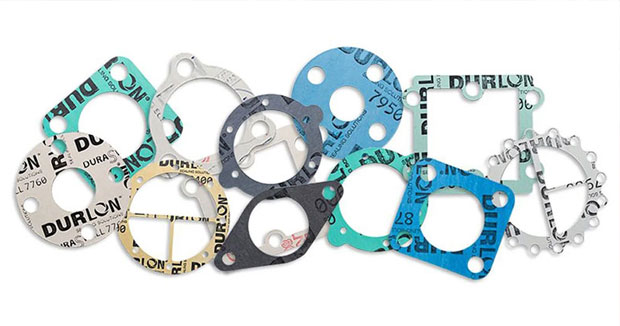As a leading distributor of custom and standard gaskets, we know that gaskets play a crucial role in sealing joints and preventing leaks for a wide variety of applications. Improper installation, however, can lead to gasket failure, leaks and costly repairs. To avoid this happening at your facility, check out our top tips to ensure proper gasket installation and long-lasting performance.
Choose the Right Gasket
When installing a new gasket, it’s important to first make sure the gasket material is suitable for the fluid or gas being sealed, and can withstand extreme temperatures, pressure and chemical exposure if necessary. We offer a wide variety of gasket materials, including metal, soft plastics such as PTFE and rubber such as Neoprene, Silicone and Viton FKM. Gasket size and thickness are also crucial to proper function, so before installation it’s important to ensure that the gasket matches the dimensions of the joint, including inner and outer diameters and thickness.
Clean Sealing Surfaces
To get the best seal from your gasket, it should be applied to surfaces that are as clean as reasonably possible. Remove any old gasket material, dirt, oil or debris from the sealing surfaces using a scraper or solvent, and also repair or replace corroded or damaged flanges before proceeding.
Ensure Proper Bolting
Bolting and the selection of appropriate fasteners for gaskets play a crucial role in ensuring the integrity, performance and safety of bolted flange connections. Proper bolting provides the necessary clamping force to compress the gasket and form a tight seal, preventing leaks of gases or liquids in piping systems, equipment and other applications. Without proper bolting, the gasket could lose compression, leading to system failure, so it’s important to make sure that bolts and fasteners can withstand the internal pressure of the system.
Inspect Flange Condition
Uneven surfaces can compromise the seal, so it’s important to check your flange for warping, dents or irregularities on the flange surfaces. Also, repair or replace corroded or damaged flanges before proceeding with a new installation.
Flange Load Requirements
Gasket materials must receive adequate flange pressure to compress sufficiently and create a tight, continuous seal. This required flange pressure, also known as the “y” factor or minimum seating stress, must be evenly applied across the entire seating area to ensure an effective seal. However, in real-world applications, the pressure distribution is rarely uniform. The highest force is concentrated near the areas around the bolts, while the lowest force typically occurs midway between two bolts. Flange designers must account for this uneven distribution to ensure reliable sealing performance.
Apply Gasket Properly
Before tightening your gasket, first do a dry fit to ensure proper alignment. For best fit, the bolts holding the gasket shouldn’t merely be each tightened in turn, but in a pattern of opposite pairs – for example, top/bottom then left/right. We recommend doing at least three passes and tightening each bolt a bit more with each pass to create the best seal.
Perform a Final Inspection
Perform a final inspection that includes checking alignment and conducting a pressure or leak test to confirm the integrity of the seal before full operation.
Is it time to install new gaskets at your facility? Then contact us to speak with our experts about your specific project needs and we’ll help you find the perfect gasket solution!


